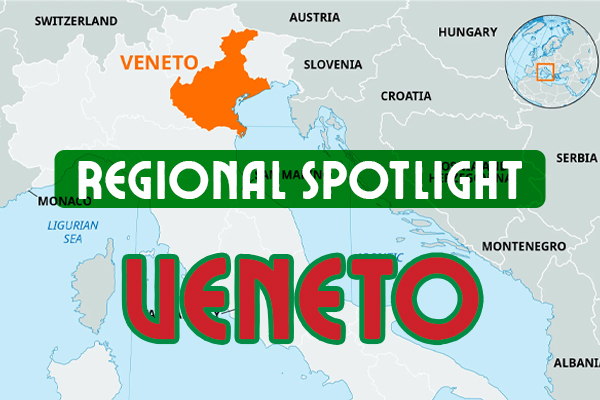Veneto, a region located in the northeastern part of Italy, is an area steeped in history, culture, and natural beauty. From the enchanting canals of Venice to the picturesque Dolomite mountains, Veneto offers an array of experiences for every traveler. In this blog, we will explore Veneto’s location, climate, history, key cities, culinary delights, agricultural products, tourism highlights, and major attractions, painting a comprehensive picture of this extraordinary region.
Location and Climate
Veneto is bordered by the Adriatic Sea to the east, providing a stunning coastline that stretches for miles. To the north, the majestic Dolomite mountains create a dramatic backdrop, while the region shares borders with Trentino-Alto Adige to the northwest, Lombardy to the west, Emilia-Romagna to the south, and Friuli Venezia Giulia to the east. This strategic location has made Veneto a crossroads of cultures and influences throughout history.
The climate in Veneto varies significantly from the coast to the mountains. Coastal areas enjoy a mild Mediterranean climate with hot summers and mild winters, making it perfect for beach holidays. Inland, the climate becomes more continental, with colder winters and warmer summers. The mountainous areas experience an alpine climate, characterized by cold, snowy winters and mild summers, attracting winter sports enthusiasts and hikers alike.
A Rich Historical Tapestry
Veneto’s history is as diverse as its landscape. The region has been inhabited since prehistoric times, with significant Etruscan and Venetic settlements. However, it was during the Roman era that Veneto began to flourish, with the establishment of cities like Verona and Padua. The fall of the Roman Empire saw the rise of the Venetian Republic, which became a major maritime power in the Mediterranean during the Middle Ages and Renaissance. Venice, the region’s capital, was a hub of trade, art, and culture, leaving a lasting legacy that can still be seen today.
Major Cities
Venice (Venezia): The crown jewel of Veneto, Venice is famous for its winding canals, historic architecture, and vibrant cultural scene. Key attractions include St. Mark’s Basilica, the Doge’s Palace, and the Rialto Bridge. A gondola ride through the Grand Canal is a quintessential Venetian experience.
Verona: Known as the setting for Shakespeare’s “Romeo and Juliet,” Verona is a city of romance and history. The ancient Roman arena, still used for opera performances, and the well-preserved medieval old town are must-see attractions.
Padua (Padova): Home to one of the oldest universities in the world, Padua boasts a rich academic and cultural heritage. The Scrovegni Chapel, with its frescoes by Giotto, and the Basilica of St. Anthony are major highlights.
Vicenza: Famous for its Palladian villas, designed by the architect Andrea Palladio, Vicenza is a UNESCO World Heritage Site. The Teatro Olimpico, one of Palladio’s masterpieces, is a testament to the city’s artistic legacy.
Treviso: Often overshadowed by its more famous neighbors, Treviso is a charming city with a well-preserved medieval center, picturesque canals, and a strong culinary tradition, especially noted for its Prosecco wine.
Culinary Delights
Veneto’s cuisine is as varied as its landscape, reflecting the region’s diverse history and geography. Key dishes include:
Risotto: Venetian risottos are renowned, particularly Risotto al Nero di Seppia, made with cuttlefish ink, and Risotto all’Amarone, infused with the robust Amarone wine from Valpolicella.
Polenta: A staple in Veneto, polenta is served in many forms, often accompanying hearty meat dishes or as a creamy side.
Baccalà: Salted cod, known as baccalà, is prepared in numerous ways, with Baccalà alla Vicentina being a regional specialty.
Tiramisu: This world-famous dessert has its origins in the town of Treviso. Layers of coffee-soaked ladyfingers, mascarpone cheese, and cocoa powder create a delectable treat.
Prosecco: The sparkling wine Prosecco, produced in the hills around Valdobbiadene and Conegliano, is a symbol of Venetian conviviality and celebration.
Click here to browse Recipes from the Veneto Region
Agricultural Highlights
Veneto is a significant agricultural region, producing a variety of crops and products. Key agricultural highlights include:
Wine: Veneto is one of Italy’s top wine-producing regions, known for its Prosecco, Amarone, and Soave wines. The vineyards of Valpolicella and the Prosecco hills are famous worldwide.
Rice: The Po Valley, part of which lies in Veneto, is one of Italy’s main rice-growing areas, providing the essential ingredient for the region’s renowned risottos.
Vegetables: Veneto’s fertile plains produce an abundance of vegetables, including radicchio from Treviso and asparagus from Bassano del Grappa.
Tourism and Major Attractions
Tourism is a major economic driver in Veneto, thanks to its wealth of attractions and activities. Key highlights include:
Venice: Beyond the well-known sights, Venice offers a myriad of lesser-known treasures, such as the islands of Murano and Burano, famed for glassmaking and lace, respectively.
Lake Garda: The southeastern shore of Lake Garda lies in Veneto, offering beautiful scenery, charming towns like Peschiera del Garda, and a range of water sports.
The Dolomites: This mountain range offers some of the best skiing and hiking in Italy. Cortina d’Ampezzo, known as the “Queen of the Dolomites,” is a top destination for winter sports.
Valpolicella: This wine region is perfect for vineyard tours and tastings, where visitors can sample Amarone and other local wines.
Padua’s Botanical Garden: Founded in 1545, it is the world’s oldest academic botanical garden still in its original location, featuring a vast collection of plants.
Things to See and Do
Whether you’re interested in history, culture, nature, or gastronomy, Veneto has something for everyone. Here are some top activities:
Explore Venetian Canals: A boat tour or gondola ride through Venice’s canals offers a unique perspective of this historic city.
Visit Juliet’s House: In Verona, visit the famous balcony and house associated with Shakespeare’s tragic heroine.
Taste Local Wines: Take a wine tour in the hills of Valpolicella or the Prosecco region to experience the local viticulture.
Hike in the Dolomites: The Dolomites offer stunning hiking trails with breathtaking views, suitable for all levels of hikers.
Attend an Opera: Experience world-class opera in the Roman arena of Verona, a truly unique setting for musical performances.
Conclusion
Veneto is a region that encapsulates the essence of Italy: rich history, stunning landscapes, vibrant cities, and delicious cuisine. Whether you are wandering the streets of Venice, savoring a glass of Prosecco, or exploring the natural beauty of the Dolomites, Veneto offers an unforgettable experience. This region’s diverse attractions and deep cultural heritage make it a must-visit destination for any traveler seeking to discover the heart of Italy.

